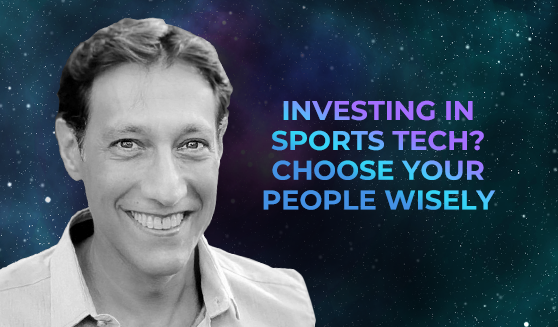
Unsurprisingly, tech investments (and tech startups seeking investment) often focus on…well, tech. A founder will talk endlessly about their innovation, assuming that investors will get excited about its world-changing possibilities; and investors will seek out the tech with the most potential to disrupt the status quo of established markets.
But this approach might not be wise if you’re working in the sports segment. Speaking on the LEAP:IN podcast, Daniel Bernard (Sports Industry Investor) urged investors interested in dipping their toes in the sports pond to focus less on the tech, and more on the people.
But why are people so important in sports? Why are human beings the differentiator between a sports tech company that will thrive, and one that won’t?
When you work in sports, you start with passion
OK, people are actually important in all segments, not just sports. You only have to type ‘invest in people’ into Google and you’ll see that it’s a bit of a buzz-phrase for investors and investment journalism; although critics like Noa Matz (Social Psychologist and Operating Partner at F2 Venture Capital) suggest that investment firms often don’t really know how to evaluate people’s potential.
For Bernard, however, ‘investing in people’ is far from an empty platitude when it comes to sports – because “the main thing I’ve come to understand in sports, more than any other industry that I’ve worked in, is the impact of people. It’s all about people.”
“You cannot compensate for the wrong people with fantastic technology or great process – it just will not work.”
The reason for that is passion. Almost everyone working in sports tech started with some kind of a passion for sports – and it’s the passion that continues to drive their involvement with the industry. The impact of this is easier to understand if you compare it with other industries: a founder of a startup in agritech, for example, probably didn’t start out with a burning passion for agriculture. More likely, they worked in the industry or in related industries; built up a depth of experience; saw a gap in the market, and launched into that gap. But a sports tech founder might have launched their company without much relevant industry experience at all – driven instead by passion, and a fiery belief in the way their idea might revolutionise a sport.
So passion has pros and cons
Bernard emphasised the positive value of passion, noting that “having that connector is incredible.” It unites teams, drives high morale, and pushes startups to work tirelessly and achieve as much as they possibly can.
But it has its weaknesses, too. We’ve already touched on the idea that passion could motivate a founder to launch a business without enough relevant experience or industry knowledge; and from the investment side, passion could also drive poor investments. “I see that happening a lot,” Bernard said, and urged investors without a background in the sports industry to “be very, very careful.”
Instead of blindly throwing their money into the pot, new sports investors should connect with VCs who are already successful in the space – perhaps becoming a limited partner as an investor through an established sports VC, to reduce risk and learn through that relationship.
On the founder side, Bernard also pointed out that passion can drive business decisions that haven’t been thoroughly thought through – “for that reason, I think there’s a very high percentage of failures in sports tech startups.”
“Just because it’s sport doesn’t mean you should be ignoring the ROI potential, the projections, the due diligence. I see some people cutting corners because it’s sport, and there’s no reason to do that – people should stick with the same [business] principles.”
This is really important to keep in mind right now, because sports startups are gaining traction among investor circles. One particularly hot growth area is sports performance tech – investors are backing companies that promise to build better athletes. Brian Moore (CEO of Orreco) is in the sports performance and data science sector, and his company secured a $3.6 million investment in January 2021. He told Crunchbase “there’s a huge amount of interest in it right now – it’s just exploded.”
According to the SportsTechX VC Report 2021, investments reached a new high last year – with USD $8.3 billion invested globally in sports tech by September, and about $12.7 billion by the end of 2021 (more than the previous three years combined).
Sports tech investors need to invest in passionate people – because it’s an industry driven by emotion. And they also need to make sure that those passionate people have the experience and industry knowledge to actually make a business work. Not just for a few months or a year, but for long enough to deliver a strong return on investment.
Invest in technology you believe in, definitely. But also invest in people you’re confident can drive that tech to its full potential in the market.








